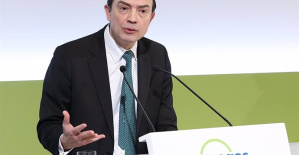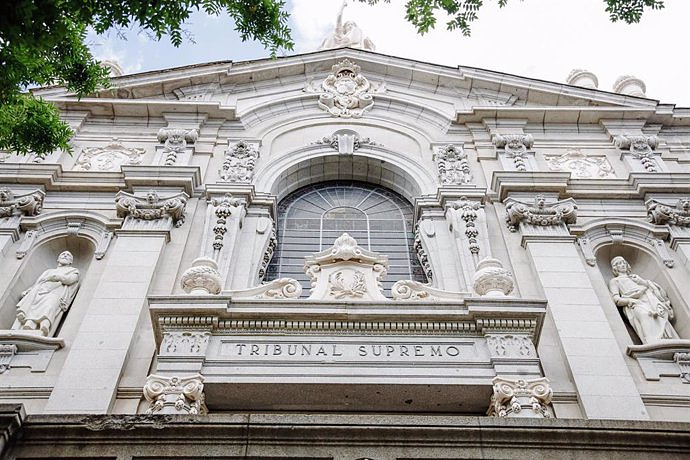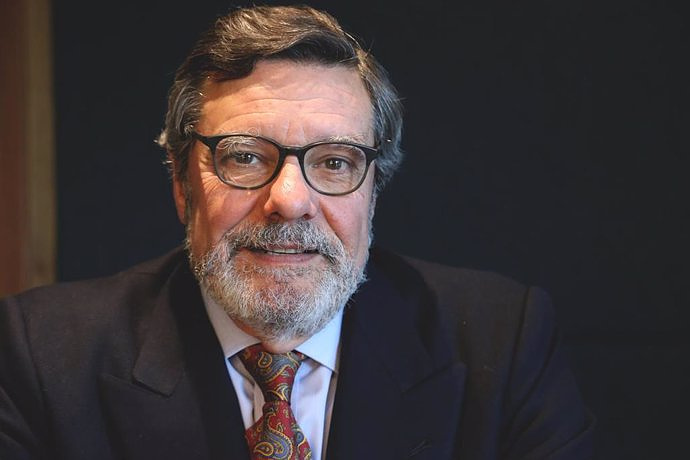The latest ballistic launch occurs at a key moment for world geopolitics
Pyongyang seeks to maintain its global relevance with the protection of Russia and China
MADRID, 4 Oct. (EUROPA PRESS) -
In the midst of the Russian invasion of Ukraine and in the face of a growing alliance between the United States and South Korea, Kim Jong Un has accelerated the consolidation of the North Korean missile program to deal with what he has called the "double standards" of the West.
With the launch of eight missiles in just ten days, Pyongyang has set off all the alarms in a new attempt to show strength after the visit of the US Vice President, Kamala Harris, to South Korean territory, where she has taken the opportunity to underline the existing alliance between the parts.
Tuesday's launch comes at a key moment in world geopolitics and has led Prime Minister Fumio Kishida to speak of a "barbaric act." The missile has flown over Japan and has forced part of the population to take refuge, something that has not happened since 2017.
For Kim, however, the ballistic program is framed in self-defense, in the idea of "being ready to mobilize in full capacity" in case of external attack. The North Korean leader continues to accuse the United States of trying to "demonize North Korea" to justify its policies and insists that the measures taken by Washington against the country are purely "illegal and hostile". Kim maintains that the attitude of the North American country pushes North Korea, victim of "dangerous" actions that place it in a compromised place, one step away from the war conflict.
Gone is the attempt at rapprochement between Kim and former US President Donald Trump, a 'rare bird' that managed for the first time that the North Korean authorities offered an approximate deadline to achieve denuclearization and the dismantling of the nuclear arsenal.
After several meetings that predicted progress, the 2019 summit in Hanoi suddenly stopped the process: the US administration refused to withdraw the sanctions imposed against North Korea, a requirement presented by Pyongyang to agree on an effective denuclearization process on the peninsula.
Although the New York tycoon had suspended joint military exercises with South Korea, the talks stalled. Now, with Biden at the helm, Washington has recalibrated his presence in the region, sparking new tensions. Under his Administration, aircraft carriers such as the 'US Ronald Reagan' have been deployed and precision bombing maneuvers have been carried out.
South Korean President Yoon Suk Yeol, who has increased resources for containment and preparation for a possible North Korean attack, has been described by Kim as a "confrontational maniac who has gone much further than any previous South Korean leader." ".
Accused of being a gangster, Yoon is carrying out a strategy that for many experts will only exacerbate the arms race in the region and favor the conflict due to a miscalculation.
The policies promoted by Yoon advocate strengthening the alliance with the United States and give a new meaning to the so-called 'Kill Chain', the Seoul system designed to "raze" North Korea in a matter of minutes if necessary.
It is a triple plan that includes an air defense system to eliminate the enemy's ballistic missiles, a large-scale protocol to attack Pyongyang and a series of decisive attacks that would kill the main leaders of the country, including Kim Jong. A. However, the idea is mainly to prevent the launch of the missiles in question from the North Korean side.
Last July, his Administration announced the creation of a strategy command for 2024 to supervise precisely this type of movement after Seoul feared being abandoned by Washington during Trump's term, which threatened to withdraw troops --more than 28,000 troops-- from the area if South Korea did not pay millions of dollars in exchange for military support.
Despite the fact that South Korea is considering tightening the sanctions imposed against Pyongyang after the latest round of ballistic tests, the Government also promises to make an effort to achieve denuclearization, for which the Unification Ministry has urged North Korea to respond to the plan of Yoon and the offer of dialogue that this implies.
Kim himself has recently warned that he is prepared to test his nuclear arsenal in the event of a war with the United States and South Korea. To do this, he ensures that the North Korean forces are "fully prepared to respond to any crisis."
"Our nuclear capabilities are prepared to be mobilized with all their power in accordance with the objective for which they were created," he stresses in relation to measures that defy the sanctions and prohibitions of the United Nations Security Council against the Asian country.
Already in early September, Pyongyang passed a law declaring itself a nuclear state, while Kim said he felt pressured and ruled out the possibility of talks or agreements on abandoning the nuclear program.
Despite the threat of sanctions, Pyongyang conducted six nuclear tests between 2006 and 2017. South Korean intelligence now believes that North Korea plans to conduct a nuclear test between October 16 and November 7 at Punggye Ri, where it has a tunnel and facilities prepared for this type of test.
Kim Yo Jong, the sister of North Korean leader Kim Jong Un, already flatly rejected in August an economic aid plan offered by the South Korean government in exchange for denuclearization measures, which she came to describe as "the height of madness."
In this situation, the South Korean authorities have already warned that South Korea intends to "respond forcefully" to the latest North Korean "provocations".
There are many who point out that the detonation of a nuclear weapon would turn the tables and would even provoke a response from Washington, which would not remain on the sidelines, although everything indicates that Pyongyang is currently seeking to maintain its global relevance despite its weaknesses thanks to the protection of actors such as Russia and China.

 Exploring Cardano: Inner Workings and Advantages of this Cryptocurrency
Exploring Cardano: Inner Workings and Advantages of this Cryptocurrency Seville.- Economy.- Innova.- STSA inaugurates its new painting and sealing hangar in San Pablo, for 18 million
Seville.- Economy.- Innova.- STSA inaugurates its new painting and sealing hangar in San Pablo, for 18 million Innova.- More than 300 volunteers join the Andalucía Compromiso Digital network in one month to facilitate access to ICT
Innova.- More than 300 volunteers join the Andalucía Compromiso Digital network in one month to facilitate access to ICT Innova.-AMP.- Ayesa acquires 51% of Sadiel, which will create new technological engineering products and expand markets
Innova.-AMP.- Ayesa acquires 51% of Sadiel, which will create new technological engineering products and expand markets Enagás earns 65.3 million in the first quarter, 19.5% more, and aims to achieve its annual objectives
Enagás earns 65.3 million in the first quarter, 19.5% more, and aims to achieve its annual objectives The Talía celebrate the Spanish performing arts with some allusion to sexual violence after the Ramón Paso case
The Talía celebrate the Spanish performing arts with some allusion to sexual violence after the Ramón Paso case IU will go with Sumar to the European elections but freezes for now the organic relationship with Díaz's party
IU will go with Sumar to the European elections but freezes for now the organic relationship with Díaz's party RELEASE: FirstElement Fuel is selected as one of the 40 best GreenTech companies in the United States
RELEASE: FirstElement Fuel is selected as one of the 40 best GreenTech companies in the United States How Blockchain in being used to shape the future
How Blockchain in being used to shape the future Not just BTC and ETH: Here Are Some More Interesting Coins Worth Focusing on
Not just BTC and ETH: Here Are Some More Interesting Coins Worth Focusing on Looking for video games that value the neighborhoods of Valencia
Looking for video games that value the neighborhoods of Valencia UPV researchers improve the efficiency of air conditioning systems using a geothermal heat pump
UPV researchers improve the efficiency of air conditioning systems using a geothermal heat pump València is committed to citiverse and smart tourism to be "the reference technological hub of the Mediterranean"
València is committed to citiverse and smart tourism to be "the reference technological hub of the Mediterranean" Valencia displays its "innovative and technological potential" at the Emerge Americas event in Miami
Valencia displays its "innovative and technological potential" at the Emerge Americas event in Miami A million people demonstrate in France against Macron's pension reform
A million people demonstrate in France against Macron's pension reform Russia launches several missiles against "critical infrastructure" in the city of Zaporizhia
Russia launches several missiles against "critical infrastructure" in the city of Zaporizhia A "procession" remembers the dead of the Calabria shipwreck as bodies continue to wash up on the shore
A "procession" remembers the dead of the Calabria shipwreck as bodies continue to wash up on the shore Prison sentences handed down for three prominent Hong Kong pro-democracy activists
Prison sentences handed down for three prominent Hong Kong pro-democracy activists ETH continues to leave trading platforms, Ethereum balance on exchanges lowest in 3 years
ETH continues to leave trading platforms, Ethereum balance on exchanges lowest in 3 years Investors invest $450 million in Consensys, Ethereum incubator now valued at $7 billion
Investors invest $450 million in Consensys, Ethereum incubator now valued at $7 billion Alchemy Integrates Ethereum L2 Product Starknet to Enhance Web3 Scalability at a Price 100x Lower Than L1 Fees
Alchemy Integrates Ethereum L2 Product Starknet to Enhance Web3 Scalability at a Price 100x Lower Than L1 Fees Mining Report: Bitcoin's Electricity Consumption Declines by 25% in Q1 2022
Mining Report: Bitcoin's Electricity Consumption Declines by 25% in Q1 2022 Oil-to-Bitcoin Mining Firm Crusoe Energy Systems Raised $505 Million
Oil-to-Bitcoin Mining Firm Crusoe Energy Systems Raised $505 Million Microbt reveals the latest Bitcoin mining rigs -- Machines produce up to 126 TH/s with custom 5nm chip design
Microbt reveals the latest Bitcoin mining rigs -- Machines produce up to 126 TH/s with custom 5nm chip design Bitcoin's Mining Difficulty Hits a Lifetime High, With More Than 90% of BTC Supply Issued
Bitcoin's Mining Difficulty Hits a Lifetime High, With More Than 90% of BTC Supply Issued The Biggest Movers are Near, EOS, and RUNE during Friday's Selloff
The Biggest Movers are Near, EOS, and RUNE during Friday's Selloff Global Markets Spooked by a Hawkish Fed and Covid, Stocks and Crypto Gain After Musk Buys Twitter
Global Markets Spooked by a Hawkish Fed and Covid, Stocks and Crypto Gain After Musk Buys Twitter Bitso to offset carbon emissions from the Trading Platform's ERC20, ETH, and BTC Transactions
Bitso to offset carbon emissions from the Trading Platform's ERC20, ETH, and BTC Transactions Draftkings Announces 2022 College Hoops NFT Selection for March Madness
Draftkings Announces 2022 College Hoops NFT Selection for March Madness



























